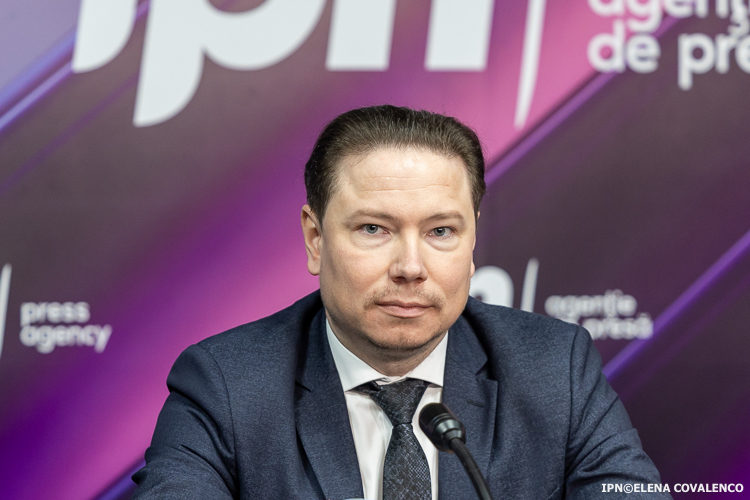
The Republic of Moldova generally has no problems in terms of the periods for judging cases, compared to the states that are part of the Council of Europe. However, there is a big problem in the case of high-profile cases in which trials are long, which gives society the impression that the situation is the same on all causes, the chairman of the Superior Council of Magistracy (SCM) Sergiu Caraman stated in a public debate titled "Citizens' Trust in Justice, Developments and Assessments".
"We are somewhere up in terms of the periods for examining cases. The Republic of Moldova, globally speaking or in general, has no problems with the periods for judging cases. The Republic of Moldova had and continues to have problems with the quality of justice," said Sergiu Caraman.
According to the head of the SCM, problems related to the examination periods are witnessed in the cases of public interest, those that are widely publicized and in which the society expects results, but these do not come: "It is a big problem because it creates the impression that on all the cases, in the courts, they work as in the case of high-profile ones."
As for citizens' trust in the justice system, Sergiu Caraman said that the latest survey indicates an improvement. Every third citizen said that things in justice changed for the better in the last three years. When asked about trust in professionals, the respondents said they have greater trust in the legal profession, the police, but less in judges and prosecutors. A question arises here, "how many of them interacted with courts" - only 17% of those interviewed.
"Most of the citizens form their opinion about how the judicial system works either from the press or from someone's words, including from recommendations or opinions expressed previously," said Sergiu Caraman.
The SCM chairman also made reference to a study conducted among the citizens who were entering/leaving the court, and the results show that 60% of those surveyed said the courts provided them with quality services, that they were treated with respect, and these indicators, according to Sergiu Caraman, confirm the change of things in the judiciary.
However, the head of the SCM does not deny the existence of unfortunate cases in the judicial system. For example, in 2024, the judiciary examined almost 250,000 cases, of which 3,500 were criminal cases centering on road accidents.
"No one noticed how the 3,500 cases were examined, but everyone saw that unfortunate case, when a minor died in the accident, and the driver was drunk. The case was tried longer than it should have been and the statute of limitations expired. Respectively, the case was dropped. It was a case that was publicized and, based on it, the citizens formed their opinion that things in the justice system continue to be bad," said Sergiu Caraman.
The public debate entitled "Citizens' trust in justice, developments and assessments" was staged within the project "IPN News Agency for Social Cohesion and a Pro-European Moldova", funded by IMS.
Moldova pro-europeană
See related articles:
- Tiraspol encourages production of green energy. Igor Boțan explains changes in Transnistrian region
- Maxim Gritsunic: Energy efficiency must be accelerated through close cooperation between central and local authorities
- Ivan Gadiac: Energy efficiency of homes became a priority
- Low trust in justice explained differently by prosecutors, judges and citizens
- Everyone is entitled to fair and equitable justice, state secretary of Justice Ministry
- Liviu Vovc: A new and even more dangerous crisis may erupt in the Transnistrian region
- Igor Boțan: Who bears responsibility for energy crisis in Transnistrian region...
- "Energy crisis in "Bermuda Triangle". Episode 3: Chisinau’s position". IPN debate
- Igor Botan: Transnistrians have gotten used to gas delivered as humanitarian aid
- Mariana Kalughin: We have not yet had a mature political class that has succeeded in fighting corruption
- Tatiana Cojocari: Population can be a strong ally against corruption
- Fight against corruption must be basis of development of society, MP
- Reintegration depends on professionalism and determination of constitutional authorities, Ghennady Ciorba
- Tiraspol has always been an instrument used to put pressure on constitutional authorities in Chisinau, opinion
- Energy crisis in "Bermuda Triangle". Episode II: Tiraspol’s position. IPN debate
- Igor Boțan: Temperature of the Kremlin's propaganda will rise
- Gheorghe Bălan: Russia uses energy instrument to put pressure on Moldova
- Victor Ciobanu: The Kremlin wanted electricity to be turned off on both banks of the Nistru
- Alexandru Flenchea: If the Transnistrian region’s economy collapses, Moldova will not cope
- Parlicov: If left bank is freed from dependence on Russian gas, reintegration will be stimulated
- Lack of transparency in negotiations distances people from both banks of the Nistru, Alexandr Makuhin
- Daria Russu: More romanian language lessons needed in russian or ukrainian-language schools
- Alexandr Makuhin: Everyone has the right to education, regardless of the chosen language
- Ukrainian refugee parents encouraged to integrate their children by enrolling them in school
- Iurie Rija: Farmers need a financial system to protect them from credit traps
- The importance of agriculture for Moldova's economy is decreasing, says sociologist Tatiana Cojocari
- Moldova's agriculture has reached a crossroads, Minister Ludmila Catlabuga
- Cojocari: 25% of young people don't support European integration and regret the dissolution of the USSR
- Alexandr Petrov: The concept of European integration is not understood by all young people
- Cristian Vizir: Voting should be allowed from 16, at least for some types of elections
- Cantarji: Men have higher pensions than women because of salary and internship
- Gap between the average income of women and men is growing, Marina Soloviova
- Makuhin: Astonished by the inequalities that persist in an obviously feminine society
- Public opinion must be correctly informed, not manipulated, sociologist Tatiana Cojocari
- Result of referendum is historic and reflects desire to belong to European family, MP
- Mihai Mogâldea: Some of those who support European integration were not necessarily in favor of holding a referendum
- Citizens confirmed by vote that they have been waiting for EU integration for a long time, MP














